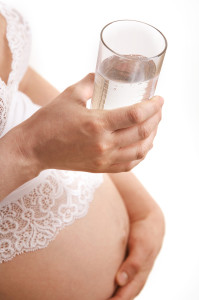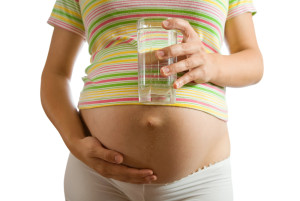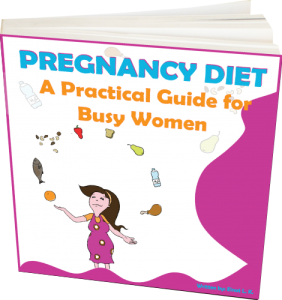 Drinking water is especially important during your pregnancy, but getting enough liquid can be difficult. Some women dislike unsweetened drinks such as water, but they know they shouldn’t be drinking a lot soda during their pregnancy. Events during the day (such as road trips) can also make us forget to drink enough water. Sitting in an air-conditioned office lessens thirst but you still need to drink a certain amount.
Drinking water is especially important during your pregnancy, but getting enough liquid can be difficult. Some women dislike unsweetened drinks such as water, but they know they shouldn’t be drinking a lot soda during their pregnancy. Events during the day (such as road trips) can also make us forget to drink enough water. Sitting in an air-conditioned office lessens thirst but you still need to drink a certain amount.
During your pregnancy, there is no arguing about the importance of drinking water. You need more fluids to support the larger volume of blood in your body. Drinking helps your circulation, which assists your immune system in fighting against illnesses and ensures your baby gets the nutrition and oxygen it needs.
If you are constantly dehydrated in the first trimester of your pregnancy, you may end up suffering from a low amount of amniotic fluid, which can cause limb deformities in your baby. It is especially important to drink plenty of water if you suffer from morning sickness, since vomiting can lead to significant liquid loss.
Dehydration during your second or third trimester can cause your body temperature to rise due to poor circulation, which in turn can cause damage to your child. You may also suffer from muscle cramping due to severe dehydration, as well as fatigue, or even preterm labor.
Drinking a lot of water, on the other hand, has the following benefits:
- Drinking a lot of water helps with the production of blood cells, which are necessary to transport nutrients and oxygen to your growing baby. Your blood volume will increase by almost 50 percent during your pregnancy, and water is needed to support this.
- Plenty of fluids can help prevent urinary tract infections (UTIs), which are a major concern during pregnancy. Although a UTI is not dangerous as such, the infection can enter the bloodstream and from there to spread to other organs. A UTI can also cause a kidney infection, which increases your risk of low birth-weight and preterm labor. It has also been linked to a higher risk of fetal mortality.
- By drinking a lot of water you can prevent or minimize edema, or water retention in the tissue outside the bloodstream. You are at an increased risk of edema during the later stages of your pregnancy. Edema can be painful and might make it difficult for you to walk, especially now that you are carrying the extra weight of your baby.
- Dehydration can cause contractions which lead to preterm labor. By drinking water you can lower the risk of a preterm labor which could be harmful for your baby.
- Drinking a lot of water can help prevent constipation and the hemorrhoid problems that often follow.
- Water has a positive effect on your metabolism as well as on the appearance of the skin.
Alexia didn’t like to drink water, so most of her liquid intake came from sodas. During her pregnancy, she learned that she should no longer drink soda, for health reasons. She decided to switch to drinking water. It all went well until the final months of her pregnancy. She lived in a warm part of the country and was due in the middle of the hottest month of the year.
Although she did drink some water, she always seemed to forget to do so (possibly because the taste did not appeal to her). Her contractions came almost a month early and she was lucky to deliver a healthy child. The doctors were concerned about her state of dehydration, attributing the cause of the preterm labor to her low intake of fluids. She was horrified and began drinking water regularly, which helped her general well-being as well as her breastfeeding.
It is recommended that you drink 8 to 12 glasses of liquid every day. This amount contributes to your alertness and vitality. It is generally not recommended to drink sodas or juices, which contain lots of sugar, or regular tea and coffee, which contain caffeine.

Following the tips below can help you drink more water during your pregnancy:
- Carry a bottle of water with you wherever you go, together with a small pack of stickers. Every time you have a drink, put a sticker on the bottle. Now you have a fun way of tracking how much water you drink every day.
- Put a reminder on your phone. Set it to every hour, or more often if you want. Each time the alarm goes off, have at least one glass of water.
- Count how many stickers you have on your bottle at the end of every day. Fill in a table of your accomplishment and put it somewhere you can see it. You can use Seinfeld’s method of persistence from chapter 4 in this the book to encourage you even further.
- When someone offers you a drink, accept it even if you are not thirsty.
- During meetings at work or with friends, order a bottle of water and make sure to finish the whole bottle during the meeting.
Mary had always been doing a lot of exercise, and she didn’t slow down during her pregnancy. Eating healthy was never a problem for her, but she would forget that she needed to drink more water now that she was pregnant. During exercise, she would sweat a lot and lose fluids that way. Now she began to feel faint after every workout and gradually began to get weaker and weaker. Her doctor ran many different tests but found nothing wrong with her – until they both realized Mary had a simple case of dehydration. She began drinking more water and regained her energy in a matter of weeks.
Did you know?
The signs of dehydration:
- The first sign of dehydration is − no surprise − thirst! If you are thirsty, make sure to drink a lot of water.
- A rapid pulse not attributed to a sudden effort or exertion on your part, is also a sign of dehydration.
- One of the easiest ways to tell if you suffer from lack of fluids is to check your urine. If the color is transparent or light yellow, you have no problems. If it is dark yellow and has a strong odor, make sure to increase your water intake.
- A dry mouth can be a sign of dehydration.
- Diarrhea and vomiting during your pregnancy, no matter the reason, may cause dehydration. If you suffer from these, make sure to drink plenty of water to recover your water losses.
P.S.
Looking for a good place to start reading up on healthy eating habits for you and baby?
Try “Pregnancy Diet: A Practical Guide for Busy Women“ for simple and easy tactics to prepare nourishing meals during your pregnancy.
If you found this information helpful, click below and share your feelings.
[loveclaw_buttons]
t

